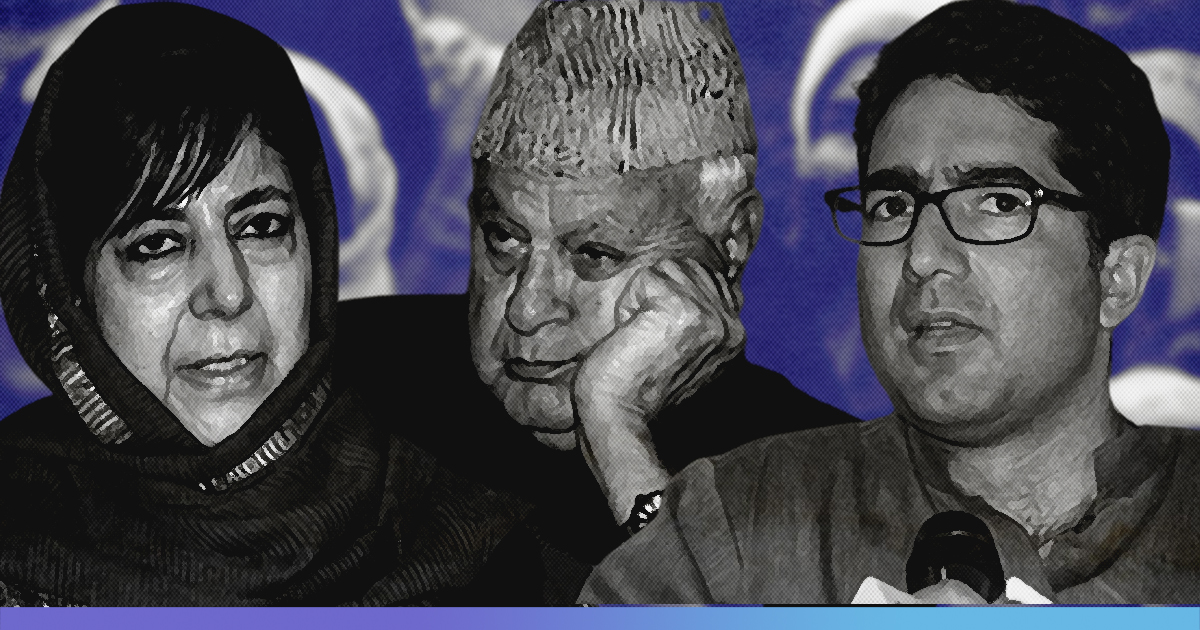In a recent move, Kashmir’s political detainees, including top leaders, are being forced to sign a bond as a condition of their release, that bars them from speaking or commenting on the “recent events” in the state. “Recent events” likely signifies anything related to Article 370 or the decision to bifurcate Jammu and Kashmir into two Union territories along with scraping its status as a state.
What Are The Conditions Of The New Bond?
Two women detainees were recently released, before which they were made to sign a modified version of the standard ‘Section 107’ bond. Normally, this is used by a district magistrate when he wants to exercise his administrative powers under the Criminal Procedure Code, in order to take someone into preventive custody.
Potential troublemakers, under the bond’s usual terms, have to promise “not to commit a breach of the peace” or carry out any acts that “may probably occasion a breach of the peace”. If a detainee violates this promise, he or she will have to forfeit an unspecified sum of money to the state government.
However, the new bond ups the ante in two aspects.
First, the signatories undertake to “not make any comment(s) or issue statement(s) or make public speech(s) hold or participate in public assembly(s) related to recent events in the state of Jammu and Kashmir, at the present time, since it has the potential of endangering the peace and tranquility and law and order in the state or any part thereof for a period of one year”.
Second, for any violation of the bond, they will have to deposit Rs 10,000 as “surety” and undertake to pay another Rs 40,000 as “surety”. Violation of this commitment might also lead to their renewed detention.
According to legal experts and rights activists, these conditions are unconstitutional and problematic.
Reports say detainees released today were forced to sign bonds.Under what law is their release conditional as their detention was illegal itself? Many including Ms Mufti have categorically refused to sign these bonds. The govt with its rudderless approach is tying itself in knots
— Mehbooba Mufti (@MehboobaMufti) October 10, 2019
“Under Article 19(2) of the Constitution, freedom of speech can be restricted if there is an incitement to imminent violence. The Supreme Court has repeatedly held that advocacy – even of revolutionary views – is permitted as long as there is no incitement to violence. Section 107 of the CrPC, therefore, cannot be used in a way that makes the personal liberty of an individual conditional upon a wholly unconstitutional restriction of their right to free speech,” Gautam Bhatia, a lawyer who writes on constitutional matters, told The Wire.
The Telegraph contacted state advocate-general D.C. Raina, who denied having seen the new bond. However, he defended the existence of any such bond as “absolutely” legal.

The Telegraph

The Telegraph
“It (the change in language) does not alter or take away the basic spirit. The language is only the format, the sense remains the same…. I don’t think that (considering the bond illegal) will be the right understanding. It falls within the purview of the law,” he said.
He added that to make it more “viable”, the Jammu and Kashmir government has the right to tweak the Section 107 bond. Further, the governor under his rule had the right to amend the language of Section 107.
According to human rights activist Khurram Parvez, around 6,000 people were arrested over the last two months in the clampdown. “Many of them”, he said, were released under the new bond’s conditions.
The Logical Indian Take
This bond is an open violation of the constitutional protection of free speech in India. Freedom of speech and expression occupies a very high position in our Constitution. The Preamble itself guarantees to its citizens the “Liberty of thought, expression, belief, faith, and worship.”
A Democracy cannot survive without the existence of a free and fair exchange of ideas. Free speech definitely does not imply that a person has the right to say absolutely anything that he wants to.
But when it comes to Article 370, speaking or commenting on it does not aggravate or influence people to commit any kind of offences. It does not push people to turn against any particular caste, community or religion. It does not tarnish the reputation of another person.
Also Read: Article 370 Deterred Development In J&K? Statistics Prove State To Be Better Than Many Others











